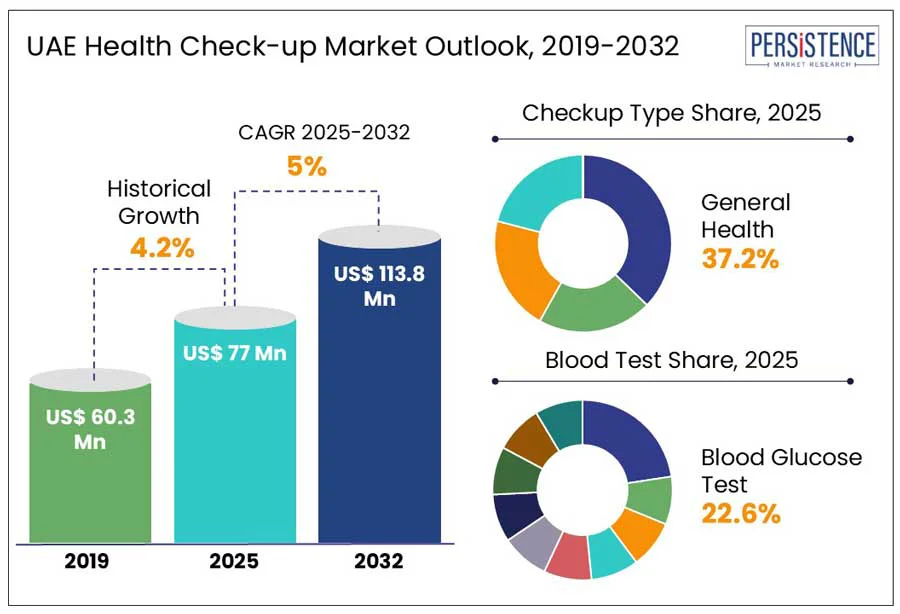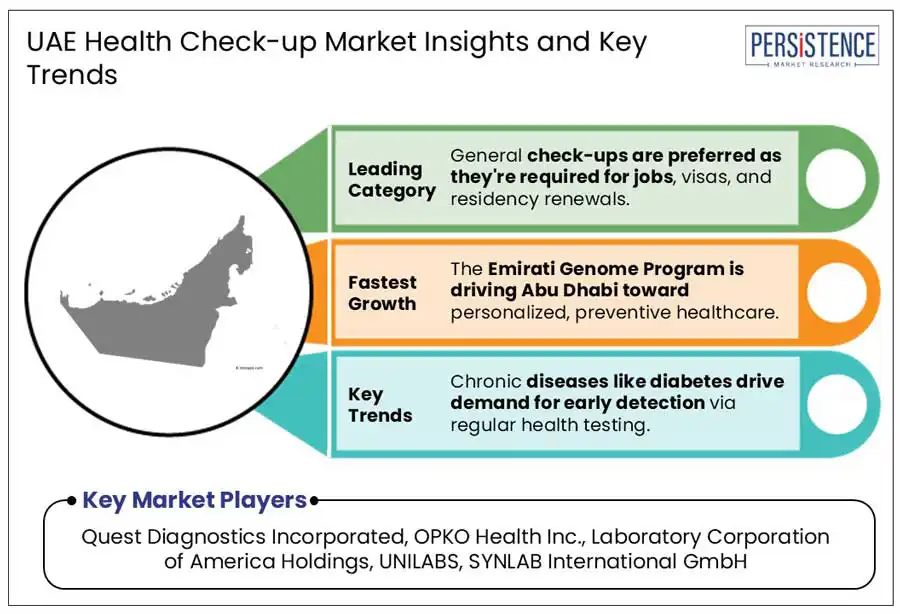ID: PMRREP35378| 180 Pages | 4 Jun 2025 | Format: PDF, Excel, PPT* | Healthcare

The UAE health check-up market size is predicted to reach US$ 113.8 Mn in 2032 from US$ 77.0 Mn in 2025. It will likely witness a CAGR of around 5.0% in the forecast period between 2025 and 2032. The UAE has recently showcased a remarkable shift in how its population approaches healthcare, from reactive treatments to proactive prevention. Central to this transformation is the rising emphasis on regular health check-ups, which are no longer viewed as optional but essential. This is evident in Abu Dhabi and Dubai, where the rising awareness of lifestyle diseases, mandatory health screenings associated with residency and employment, and novel diagnostic technologies are spurring demand for preventive care.

Key Industry Highlights
|
Market Attribute |
Key Insights |
|
UAE Health Check-up Market Size (2025E) |
US$ 77.0 Mn |
|
Market Value Forecast (2032F) |
US$ 113.8 Mn |
|
Projected Growth (CAGR 2025 to 2032) |
5.0% |
|
Historical Market Growth (CAGR 2019 to 2024) |
4.2% |
Proactive health management is anticipated to significantly push the UAE health check-up market growth through 2032, reflecting a shift toward early intervention and preventive care. Government initiatives have played a key role in promoting proactive health management. In November 2023, for example, the UAE Ministry of Health and Prevention introduced a nationwide campaign providing free diabetes screenings to Emirati residents. Similar programs not only encourage individuals to take charge of their health but also facilitate early detection.
Meeting UAE residency and employment requirements is another important market driver. Foreign nationals aged 18 and above mandatorily undergo medical fitness tests to obtain or renew their residence visas. These tests, conducted at government-approved centers, screen for communicable diseases such as hepatitis B and C, leprosy, tuberculosis, and HIV. Specific job categories, including healthcare staff, food handlers, and domestic workers, are subject to additional screenings such as pregnancy and syphilis tests for women. These mandatory health check-ups have successfully promoted the well-being of UAE residents.
The UAE health check-up market is facing certain challenges due to the prevalence of unnecessary testing practices and surging reliance on expatriate healthcare workers. The country’s healthcare system is predominantly staffed by expatriates. As per a study published in the journal Global Health by the National Center for Biotechnology Information (NCBI), around 96% of healthcare workers in Abu Dhabi and 90% in Dubai are foreign nationals. This surging reliance results in high staff turnover rates as expatriate workers often return to their home countries or move elsewhere for better opportunities. Such turnover disrupts continuity of care and tends to strain the healthcare infrastructure, making it difficult to maintain consistent standards in health check-up services.
The overutilization of diagnostic tests such as autoimmune disease testing and rapid influenza diagnostic tests, often propelled by financial incentives, is another significant limitation. Reports indicate that a few private healthcare providers in the UAE have been over-diagnosing patients, mainly those with comprehensive insurance plans, to capitalize on insurance payouts. This practice not only subjects’ patients to unnecessary treatment but also raises healthcare costs, potentially causing more harm than benefit. The Dubai Health Authority has acknowledged these issues and announced plans to regulate private hospital services to address over-treatment and fraud.
The UAE is positioning itself as a global leader in genomic research and personalized medicine, with far-reaching implications for the health check-up landscape, finds Persistence Market Research. The most ambitious initiative is the Emirati Genome Program, spearheaded by M42, a joint venture between Abu Dhabi’s G42 and Mubadala. As of early 2024, more than 800,000 genomes have been sequenced, including 702,000 Emirati genomes. This makes it one of the most significant national genome databases in the world.
The massive dataset enables healthcare professionals to identify genetic predispositions to diseases such as cardiovascular disorders, cancer, and diabetes early on. Hence, health check-ups are evolving from standard diagnostic panels to more predictive and customized screenings. Individuals with high genetic risk of certain cancers can be enrolled in targeted monitoring programs with specific imaging tests and biomarkers before any symptoms emerge. This is expected to foster a preventive healthcare model, lowering the long-term burden on the healthcare system.
Based on checkup type, the UAE health check-up market is divided into general health, preventive health, specialized health, and routine and wellness health. Out of these, the general health segment will likely account for a share of a leading share in 2025. This is due to the increasing prevalence of chronic diseases in the UAE. The UAE National Cancer Registry revealed that the country reports more than 4,000 new cancer cases every year, with a crude incidence rate of 46.1 per 100,000 individuals. General check-ups involving Body Mass Index (BMI) assessments, blood pressure monitoring, and blood screening serve as significant tools for early detection and management of such chronic conditions.
Specialized health check-ups, on the other hand, are anticipated to exhibit a considerable CAGR from 2025 to 2032. Technological integration has pushed the adoption of specialized health check-ups. The incorporation of innovative diagnostic tools such as imaging-based tests has improved the efficiency and accuracy of screenings. Imaging-based tests have gained traction in the UAE owing to their ability to offer detailed insights for early detection of conditions, including cancers and cardiovascular diseases. This technological development has made specialized screenings easily accessible and reliable, supporting their increasing use.
By body test, the market is segregated into blood glucose test, kidney function test, bone profile test, lipid profile test, electrolytes test, liver function test, special biochemistry, and others. The blood glucose test is expected to account for 22.6% of the UAE health check-up market share in 2025. This is mainly due to the increasing demand in the geriatric population and advancing healthcare services in the UAE. Popularity of home check-up services and competition among healthcare service providers
According to the International Diabetes Federation, the prevalence of diabetes in the UAE stands at 16.3%, markedly higher than the global average of 9.3%. The scenario is further compounded by the high prevalence of pre-diabetes. As per data from the Ministry of Health and Prevention (MoHAP) and private healthcare partners, 67% of UAE residents aged 36 to 60 are pre-diabetic. It highlights the urgent requirement for early screening and intervention, thereby spurring demand for blood glucose tests.
Tumor marker testing is predicted to hold a significant share in 2025 due to the surging cases of cancer and the rising emphasis of various companies on personalized medicine. The alarming rise of cancer cases underscores the urgency for effective screening methods. Tumor marker tests have also gained impetus as they facilitate early diagnosis and monitoring of various cancers by detecting specific substances or proteins produced by cancer cells. Technologies such as liquid biopsies provide non-invasive means to detect and monitor cancer biomarkers, allowing clinicians to assess tumor dynamics without the requirement for surgical procedures. This is specifically beneficial for patients requiring frequent monitoring, as it lowers risks and discomfort related to conventional biopsy methods.

In 2025, Abu Dhabi is estimated to generate a share of around 32.8%. This is attributed to a rising emphasis on personalized wellness programs, boom of digital health, and increasing preventive care initiatives. The emirate has been witnessing a dramatic rise in physical activity among its residents, with 53% now meeting the World Health Organization's (WHO) recommended activity levels, up from 36% in previous years, found the Department of Community Development in April 2025. This gradual shift highlights the success of community engagement programs and the growth of sports infrastructure, contributing to a health-conscious population.
Cleveland Clinic Abu Dhabi further reported a 35% growth in international patient volume in 2024, with more than 10,000 international patient encounters. This growth points toward Abu Dhabi's position as a global destination for world-class care, specifically in areas such as urology, neurology, ophthalmology, and cardiology. Innsovative diagnostic tools, including AI-assisted genomic and imaging testing, are being used to improve the efficiency and accuracy of health screenings. These technologies propel early detection of conditions such as cardiovascular diseases and cancer, enhancing patient outcomes.
Sharjah is expected to see steady growth in the foreseeable future due to increasing emphasis on community outreach and occupational health, mainly targeting vulnerable populations such as outdoor workers. For instance, the Ministry of Health and Prevention (MoHAP), in partnership with the Sharjah Supreme Council for Family Affairs (SCFA), rolled out the ‘Your Safety Is Our Goal’ campaign in 2024. This initiative focused on offering free medical check-ups to more than 6,000 outdoor workers across several parts of Sharjah, including Kalba University, Al Dhaid, and Al Hamriyah. The campaign provided first-aid training courses, examinations, symbolic gifts, and awareness lectures to improve the quality of life for residents and workers during the summer months.
The 10th edition of the My Health Conference, organized by the Health Promotion Department of the SCFA, further highlighted Sharjah's commitment to health awareness. Held in October 2024, the conference welcomed more than 2,170 attendees, including specialists, doctors, students, and leading academics. Discussions focused on promoting mental health apps, balanced nutrition, and physical activity, with recommendations for transforming schools into health-promoting environments. These were also aimed at implementing stress reduction initiatives in workplaces.
In Dubai, the corporate sector is increasingly recognizing the significance of employee well-being. Workplace wellness programs have extended beyond conventional fitness initiatives to include preventive healthcare, nutritional guidance, and mental health support. Leading corporations in sectors such as technology, oil and gas, and banking have allocated around 2 to 5% of their annual budgets to workplace health initiatives. This demonstrates a key investment in employee health.
The emirate’s status as a leading medical tourism destination further spurs demand for modern diagnostics. The Dubai Healthcare City (DHCC), which is one of the most prominent healthcare-free zones, houses more than 90 innovative diagnostic centers and laboratories. It processes over 4.5 Mn diagnostic tests every year. The Dubai Health Authority’s budget for 2023 allocated nearly 20% to laboratory infrastructure and diagnostic services, highlighting the emirate's commitment to boosting healthcare services.
The UAE health check-up market houses various digital health start-ups, specialized diagnostic centers, and private hospitals. Key private companies are offering comprehensive check-up packages that integrate lifestyle consultations with diagnostics. They are leveraging their brand trust and extensive hospital networks to remain at the forefront of the market. They are also setting themselves apart from their competitors by bundling chronic disease monitoring with preventive screenings, appealing to the high-income expat and Emirati demographic.
Several start-ups are integrating telehealth with preventive check-up services, delivering virtual consultations and home sample collections. The UAE government’s push for preventive healthcare under multiple initiatives is also augmenting competition among providers to earn the preferred provider status by meeting regulatory quality standards. This has further accelerated investment in AI-based diagnostics, international accreditation, and patient engagement apps.
The UAE health check-up market is projected to reach US$ 77.0 Mn in 2025.
Increasing inclusion of general health screenings in offices and rising prevalence of chronic conditions are the key market growth drivers.
The market is poised to witness a CAGR of 5.0% from 2025 to 2032.
Surging research work associated with genomics and strict government norms mandating certain tests for residence visa renewal are the key market opportunities.
Quest Diagnostics Incorporated, OPKO Health Inc., and Laboratory Corporation of America Holdings are a few key market players.
|
Report Attribute |
Details |
|
Historical Data/Actuals |
2019 - 2024 |
|
Forecast Period |
2025 - 2032 |
|
Market Analysis Units |
Value: US$ Bn/Mn, Volume: As Applicable |
|
Geographical Coverage |
|
|
Segmental Coverage |
|
|
Competitive Analysis |
|
|
Report Highlights |
|
|
Customization and Pricing |
Available upon request |
By Checkup Type
By Body Test
By Test Technique
By Application
By Service Provider
By End-use
By Emirate
Delivery Timelines
For more information on this report and its delivery timelines please get in touch with our sales team.
About Author